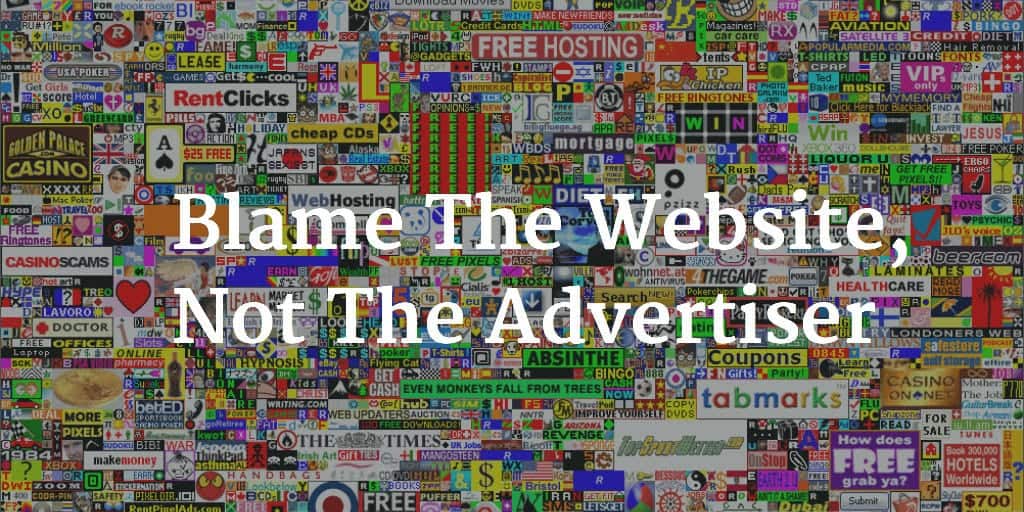It’s no secret that people hate online ads. They cover many of the websites we visit. To deal with the problem, many have turned to ad blocking software. Ad-blocking software will cost advertisers more than $22 billion this year and that number will continue to climb as more begin utilizing such browser add-ons.
It’s obvious that ads are a problem and people really hate them. But we’re blaming the wrong party. It’s not the ads that make for a horrible website experience. It’s those running the websites we should be upset with.
Ads Aren’t Bad
Website operators put ads on their site to help generate income. Many of the sites we visit every day are able to exist because of the revenue the advertising on their sites bring in. Facebook, Twitter, YouTube, Google, and countless other sites are all able to exist because of online ads. Without them, there would be no Gmail, no seeing what your friends are up to on Facebook, and no watching cat videos on YouTube when you should be working. Online advertisers will spend close to $200 billion in online advertising in 2015 and that money helps run some of your favorite sites. That’s not a bad thing.
What is bad is how those sites choose to use them.
The Real Problem
I have yet to meet a website owner who has had an advertiser force him to put their ads on her site or made them place 5 of them right in the middle of the page you want to read. No, ad placement isn’t something generally dictated by the advertiser but rather by the website owners themselves. If a website has too many ads, or the ads are too intrusive and poorly placed, it’s the websites fault, not the advertisers.
Sadly, instead of recognizing that spamming the entire website with ads is the choice of the website operator, most blame the advertisers instead. They see it as advertisers being annoying and ruining the experience, when in fact it was ruined by someone at the website itself choosing to place those ads in a way that bothered visitors.
Google tries to minimize the chances of overwhelming people with too many ads by limiting things to a maximum of 3 AdWords advertisements on any page but many sites utilize Google ads along with those from other networks to stuff their pages full. Again, the issue is with the way the website operators are implementing the ads, not the ads themselves.
So What Can We Do?
It’s obvious that for many of our favorite sites to exist we need ads. People simply aren’t going to pay to access each of the websites we go to every day (this is demonstrated by you going to the free porn sites rather than the paid ones). So what can we do?
While Google now allows you pay a monthly fee to see less or even no ads, the fact that you aren’t currently paying to do so (did you even know the option existed?) is a good sign that you, like most, hate ads but aren’t actually willing to pay to make them go away.
Some will suggest ad-blocking software. While this makes the website experience better, it also means a huge loss of revenue for websites. If they become too prevalent, your favorite sites will see a big drop in revenue. It’ll be hard or impossible for your favorite websites to continue to provide the great stuff you love, without the money to keep running. Sadly, we may see some sites shut down or look towards other methods of generating income, such as monthly fees.
In my opinion, the best way to save the ads is to start taking responsibility for them as website operators. They’re the ones that created the problem in the first place. They’re the ones with the power to solve it too. By considering where we place our ads and how they impact visitor experience, website owners can lessen the annoyance online ads often bring.
The Big Benefits Of Better Thought Out Ads
By considering how visitors experience our sites, plus how ads and their placement plays into that experience, website operators stand to benefit in a number of ways.
- They can save the online ad. Making ads less annoying could mean that web users would become more willing to let them stay on the screen. This means less ad-blocking software, more ads displayed/clicked, and more money for website owners and advertisers.
- Another benefit to really considering how ads affect the website experience is better effectiveness. Ads that aren’t bothering visitors are far more likely to be viewed and clicked. If an ad pissed you off because it’s ruining your viewing experience, you’re likely not to click it out of principal (even if you may like what it’s offering). But if we find a way to make the ads less bothersome, and people still notice them, they may be more inclined to click. More clicks means more money in the advertisers pockets.
- A better web browsing experience means greater viewership too. If you provide a great experience, people are likely to return and may also tell their friends. Provide a bad one and there’s little hope of people coming back. One popular marketing site has decided to have a big, entire page blocking popup appear every time a page loads. Since this addition to the site, I’ve stopped viewing their content (even though it was good stuff) and also stopped sending my social followers there (considering the experience your followers will have is very important to retaining the trust of your social following). Looking back at previous traffic I was sending there, they now see at least 5k less views per month. While that may not be a ton for them, there is certainly the potential that any one of those 5,000 people could have become a paying customer of theirs. Creating a great user experience has the potential to bring more people your way. A bad one has can have just the opposite effect.
- Lastly, creating the best viewing experience creates the possibility of increasing your own conversions. If people aren’t bothered by ads that get in the way of what they’re viewing, they may find it easier to get what they want/need and find their way to a conversion too.
Bettering The Ad Experience
Ads may currently be the enemy to many. In their current state, they provide an often painful web experience on countless sites. While they may not be loved by most, they are a big part of keeping the websites we love in business. Being a multi-billion dollar business, it’s unlikely they’re simply going to go away. Blocking them hurts the sites we get great value from. But there is a better way.
If those of us operating websites start to think more about the overall experience we’re creating on our sites and how ads may be helping or hindering it, we can find a balance where the ad doesn’t have to be evil anymore. We can find a way to make people turn off their ad-blockers and even consider clicking our ads.
Think about your own site. Are you doing everything you could be to make sure visitors have the best website experience possible? Together, we can change that, and maybe make the ad something that people aren’t bothered to see.

